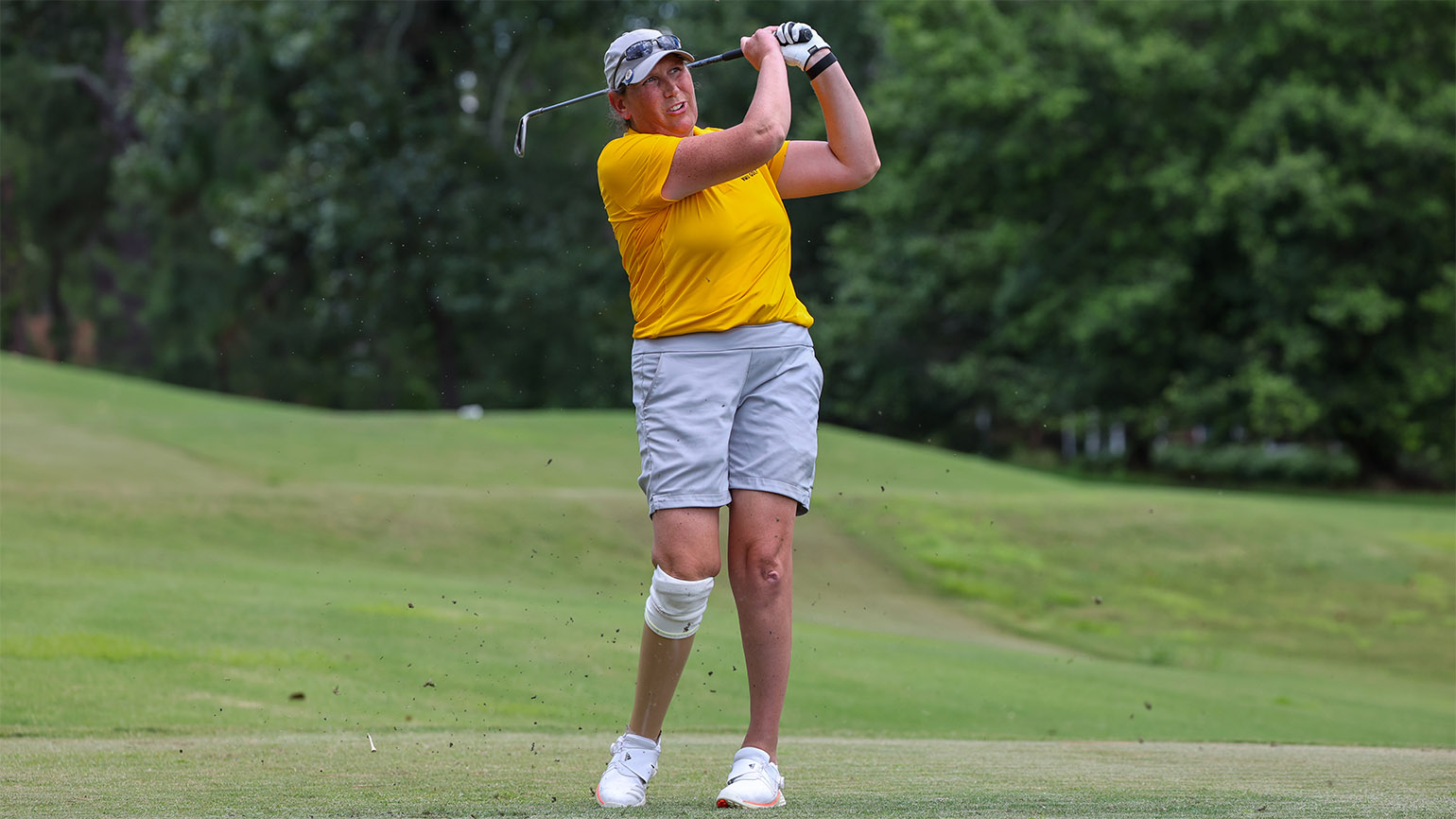One Debut Championship, Two Inspiring Champions
When Simon Seungmin Lee was 4 years old, he already recognized that he was different from other children. The way his parents described it, it was as though he were “in a dark endless tunnel,” the result of congenital autism developmental disorder.
This week at the inaugural U.S. Adaptive Open Championship, Lee, 25, of the Republic of Korea, came out on top in a riveting back-and-forth duel with Felix Norrman of Sweden to capture the first overall men’s title after the pair tied at 3-under-par 213 for 54 holes.
Lee was joined in taking home a new trophy by Kim Moore, 41, of Portage, Mich., who was born without a right foot, a severely clubbed left foot and a slight case of spina bifida, yet went on to play four years of college golf at the University of Indianapolis.
Moore, who is currently the head women’s golf coach at Western Michigan University, posted two rounds of 76 sandwiched around an 80 to earn an eight-stroke victory over Ryanne Jackson, of St. Petersburg, Fla., in the women’s overall competition.
“I just think what has been seen this week around the world, around the country, is going to elevate the amputee community, the adaptive community, and it’s pretty cool to see,” said Moore of the five days on Course No. 6 at Pinehurst Resort, which will also host the 2023 edition of the championship. “I think we’re going to have a rise in participation. I’m looking forward to seeing what happens.”
Indeed, the 96 players in the field – which included entries in each of eight impairment categories from 29 states and 11 countries – drew plenty of inspiration from one another while providing anecdotes and stories that made an impact on championship officials, volunteers, spectators and observers across the game.
“I can’t tell you how happy I am that the USGA created this event,” said Ken Green, 63, a five-time winner on the PGA Tour who lost his leg in a 2009 RV accident and has a nerve disorder. Green placed sixth overall and second in the leg impairment category. “I got to meet so many new people, and to watch their joy and their desire to play in a legit national championship, this is as good as it gets. I’m ecstatic I could have been here.”
Lee, whose caddie, Yun Seul-gi, is seeking to become the first Korean-born caddie on the PGA Tour, took a two-stroke lead after Round 2, though he professed to not realizing it because he wasn’t checking leader boards. Norrman, 25, who was diagnosed at an early age with tuberous sclerosis, a neurological condition, erased the deficit within five holes on Wednesday morning.
In fact, Norrman, who has competed in several European events, went on to take a one-stroke advantage multiple times, the last one on No. 15, when he made an up-and-down birdie from a greenside bunker on the 484-yard par 5, while Lee made par from the same bunker. But Norrman missed the green and bogeyed the 171-yard par-3 16th while Lee made a comfortable two-putt par.
Both players parred the last two holes to set up the two-hole aggregate playoff, and Lee birdied the 361-yard 17th hole from 14 feet after Norrman missed his bid from 20 feet. Norrman pressed to tie on No. 18 and made bogey, while Lee made an easy par to seal his victory.
Moore bounced back on Wednesday from a rocky Round 2 when the heat affected her. Her four-shot lead quickly expanded to eight when Jackson hit her own rough patch, and steady play ruled the day.
“I just felt like I played pretty consistent,” said Moore, who has a namesake spirit award that has been given to a deserving female golfer in each of the three college divisions since 2005. “I knew if I just kept getting pars, it would be tough to beat because birdies were hard to get out here. It’s pretty humbling and cool to be part of a little bit of golf history.”
Lee earned conditional status on the Korean PGA Tour in 2017, on his sixth attempt, becoming the first player with a developmental disability to do so. At age 20, according to an Agence France-Presse article on his accomplishment, he was assessed as having the communication skills of a 10-year-old and far less developed socialization skills.
Lee’s symptoms began in early childhood in the U.S., where his father was stationed as a diplomat, when he began to avoid eye contact and repeat what was spoken to him, a condition known as echolalia. In a recent video, he described golf as “a light of the world to me, and a way to communicate with people.”
Though his cognitive skills are limited, Lee’s coach, Kim Jong-Pil, has cited his remarkable memory and motor skills. “I think he was born a golfer,” said Kim. Once he learned etiquette and other nuances, Lee was on his way.
Lee’s mother, Ji-ae Park, recently received a special award at the Kolon Korea Open Championship for her efforts on his behalf. She beamed when recounting her son’s reaction to the honor she received. “He said: ‘Mom, thank you. I am sorry for having caused you so much trouble.’ I never thought he was able to put his feelings into such phrases.”
When Lee completed his playoff victory, there was no mistaking the howls of elation as he was doused with water by friends and family. He knew he had become a USGA champion.
Ron Driscoll is the senior manager of content for the USGA. Email him at rdriscoll@usga.org.



